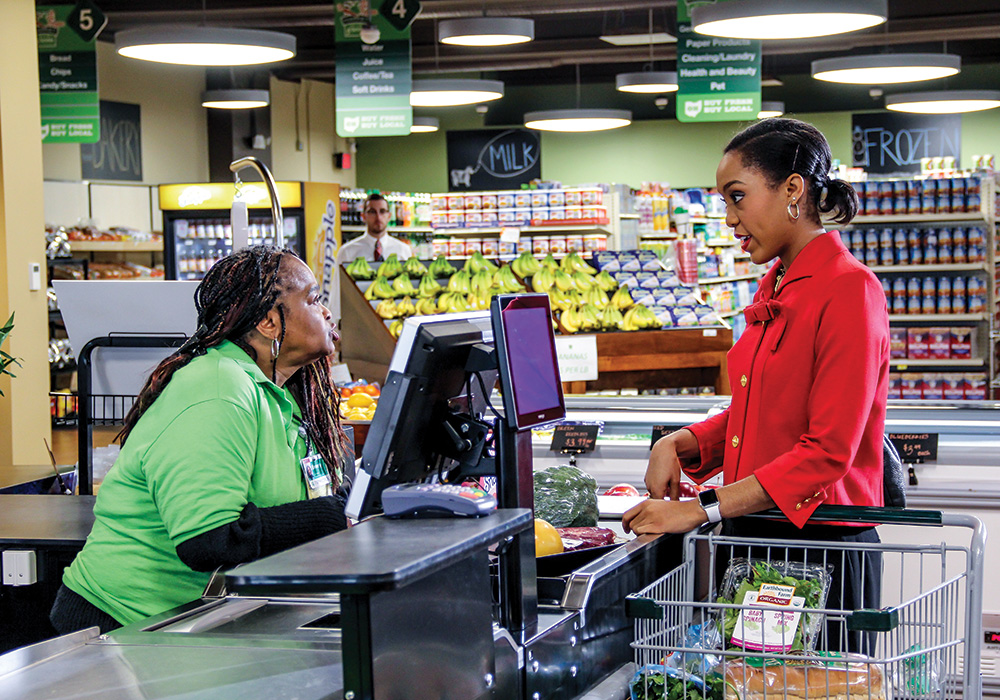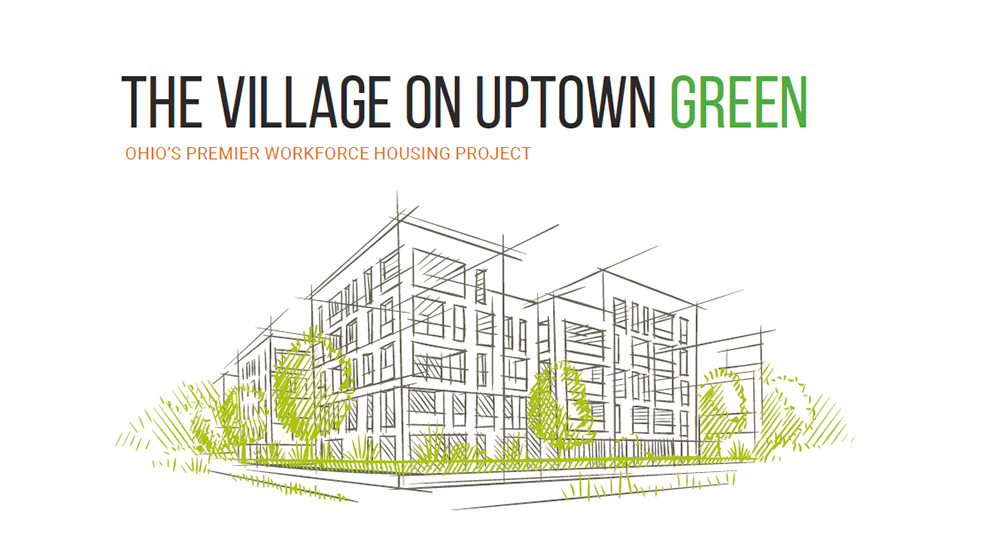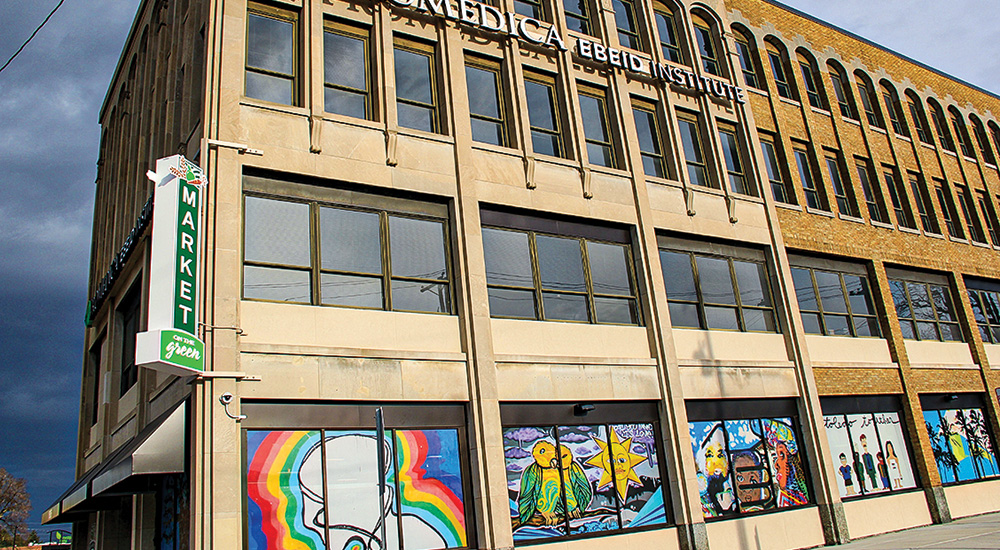Planning May 2020
HUD Secretary’s Opportunity & Empowerment Award
Healthy Neighbors, Healthy Neighborhood
Ebeid Neighborhood Promise | Toledo, Ohio

Market on the Green not only brought fresh groceries to a food desert, it has helped anchor the neighborhood. Many employees have been through the ProMedica Ebeid Neighborhood Promise's job training and wellness programs. Photo courtesy ProMedica.
By Linda McIntyre, AICP
Top-down planning is not only out of style and out of touch — it's downright impossible in many places. Outside of big, wealthy cities, local governments must often make tough choices between future-oriented investments such as neighborhood plans and essential services like police, fire, and sanitation.
That was certainly the case in the UpTown neighborhood of Toledo, Ohio. Like many of the neighborhoods fanning out from the Maumee riverfront downtown core — and many in other small industrial cities across the country — for decades UpTown has struggled with unemployment, homelessness, vacant lots and buildings, and declining investment.
Its population is small — about 1,500 people — and predominantly African American. Almost all residents in this compact neighborhood of about 250 acres rent their homes or live in group facilities — social services are concentrated here — and the median income is about $15,000, less than half of the city's median.
While UpTown is just outside Toledo's central business district, most of its building stock is commercial or institutional rather than residential. And without a critical mass of residents, for a long time the neighborhood lacked residential amenities such as grocery stores and parks — a chicken-and-egg problem for a central location close to lots of employment and entertainment options and with room to build.
For much of the last decade, the city hasn't been in a great position to help; as the regional economy slowed, its planning staff dwindled. The city's comprehensive plan is more than 20 years old, and numerous attempts at neighborhood planning over the years yielded few results.
But thanks to a volunteer-driven neighborhood plan adopted by the city in 2013 (updated in 2019), the Toledo-based national nonprofit health care company ProMedica and local partners have jump-started a health-based initiative designed to make a real impact on the UpTown community and the lives of its residents — starting with their meals and other basics.
Ebeid Neighborhood Promise
The ProMedica Ebeid Neighborhood Promise is a multifaceted initiative developed to address social determinants of health and create a model for neighborhood revitalization. The Promise framework is a culmination of community planning and community engagement efforts in four focus areas: improving health outcomes, providing stable housing, increasing access to educational opportunities, and offering job training for the surrounding community.
Health Initiatives

Photo courtesy ProMedica.
Food access and hunger are major concerns for residents in UpTown — a designated food desert. To anchor its community health hub, the ENP opened Market on the Green, a full-service grocery store in the Ebeid Institute. The store also offers nutritional education programming and runs the Market on the Green mobile market, which delivers groceries to housing locations and ProMedica facilities throughout the Toledo area.
150,000+ customers have shopped at Market on the Green
15% reduction in monthly per-member costs for those enrolled in food interventions
Housing

Illustration courtesy ProMedica.
Future plans include Village on UpTown Green, a mixed-income, mixed-use workforce housing development with 50 percent market-rate, 30 percent workforce, and 20 percent affordable (below 80 percent AMI) units.
178 new affordable housing units
$5.4 million in impact investment capital deployed for housing and small business development projects
Education and Jobs

Photo courtesy ProMedica.
In addition to the Market on the Green grocery store on the first floor, the upper floors of the Ebeid Institute's headquarters building house offices and space for its employment program, which provides job training and financial education for residents of the UpTown neighborhood.
55% of Ebeid job trainee participants obtained employment after 12 months of training (39 percent employed with ProMedica).
102 residents increased their credit score by an average of 46 points through financial coaching.
42 individuals obtained and maintained permanent employment through the ProMedica Goodwill Job Connections Center.
$4.5 million philanthropic dollars raised November 2017 to present
$0 of HUD funding has been used in the work of Ebeid Neighborhood Promise to date
Data from November 2017 To June 2019. Source: ProMedica.
Collaborative process
The groundwork for the initiative started nearly a decade ago, when the volunteer Toledo Design Center (now known as the Toledo Design Collective or TDC), working with the UpTown Association, the downtown development authority, and local government and business leaders, undertook a community planning process for UpTown. The effort culminated in a neighborhood plan. But that was just a first step.
"We wanted to create a collective vision and fight for its elements," says Paul Hollenbeck, an architect and planner who sits on TDC's executive board. The 2013 plan envisioned a tightly knit and identifiable neighborhood with corridors and districts focused on uses such as arts and entertainment, recreation, and housing. "But there was no real structure to push on implementation; there weren't even [community development corporations] anymore."
Into that void stepped ProMedica and its fellow "anchor institution" partners such as Mercy College and the Toledo School for the Arts. ProMedica was already engaged in the community, addressing Social Determinants of Health (SDOH) through its Ebeid Neighborhood Promise (ENP) program. ENP, developed by ProMedica's UpTown-based Ebeid Institute in collaboration with the New York City-based Local Initiatives Support Corporation, was designed to channel investment into underserved communities — without relying on federal funding.
"The work of TDC was already underway. Realizing an opportunity to build a partnership, not duplicate activity, and engage a larger subset of residents in the process, we became involved as a stakeholder in the planning process," says Kendra Smith, former director of the SDOH program.
ProMedica was a stakeholder with real impact: the 2013 neighborhood plan had envisaged housing around the 2.5-acre UpTown Green Park. But to attract residents, a place needs stores and amenities. ENP, which will eventually be replicated in other neighborhoods, kicked off in UpTown in 2015 with the opening of the full-service Market on the Green grocery store on the ground floor of ProMedica's Ebeid Institute headquarters building, next to the park.
ProMedica has worked with community partners to turn Market on the Green into a true community hub and to support residents, a number of whom have struggled with homelessness, addiction, and long-term unemployment.
"We partnered with The Gretchen Swanson Center for Nutrition to track usage and education patterns within the community, we've established a mobile market to serve senior housing complexes throughout the city, we are the first grocery store in Ohio to offer the 'produce perks' program, we offer free community cooking classes in a state-of-the-art teaching kitchen above the store in partnership with ProMedica's dietitian and chef teams, we accept food benefits, and we carry a range of products including local, organic, national and value brands," says Smith.
The store has attracted a wide range of shoppers; Smith says that it has served more than 150,000 customers so far. With the park, it has helped activate this part of the neighborhood, addressing the safety concerns cited in the 2013 plan.
The Ebeid Institute also provides programs to address some of the root causes of homelessness, including job training for people seeking to enter or reenter the job market. The program goes beyond employment, offering soft-skills training, financial coaching, and entry to career pipelines within the ProMedica system.
Ongoing momentum
Since the community started working on the update of the neighborhood plan in 2016, UpTown has been looking up. A 2017 plan for the Downtown neighborhood also identified priorities for UpTown, including more residential, office, and retail space and improvements to better connect the two neighborhoods.
Other organizations have followed Pro- Medica's lead and invested in the community, including the Toledo School for the Arts. Wade Kapszukiewicz, a young, policy wonk-ish mayor who, as county treasurer, had helped steer the creation of a land bank, took office in 2018.
And Ebeid Neighborhood Promise is also looking to build upon its success. Currently it is working with Socially Determined, a data analytics firm, to build a platform to track data and progress for the program's interventions. Fine-tuning is focused on tracking community- and patient-level progress, working with other data platforms, and determining how best to use data to inform future community investments. While it's too early to draw conclusions, Kendra Smith says that Pro- Medica anticipates the tool will allow the company to create a comprehensive package of data to track the impact of SDOH investments. Smith, who worked in more traditional planning roles prior to taking a job with ProMedica, says that ENP offered a gratifying way to help a community from an unusual angle.
"Being able to bridge the conversation, knowledge, and ultimately investment gap between health and community development and planning has been a great privilege and opportunity," she says.
HUD Secretary's Opportunity & Empowerment Award
AWARDEE: Ebeid Neighborhood Promise, Toledo, Ohio
GOAL: Build upon momentum of a volunteer-driven neighborhood planning effort to improve the health and vitality of the struggling UpTown neighborhood and its residents.
IMPACT: The effort brought a full-service brick-and-mortar grocery store to the neighborhood to help lay the foundation for future residential development and investment in the neighborhood, as well as a community hub complete with a teaching kitchen and space for programs, services, and events. Program offerings also include job and financial training for neighborhood residents.
JURY COMMENTS: This is a holistic approach with a focus on addressing root causes of community challenges, not just symptoms. The fact that this initiative has achieved significant, community-driven improvements without federal funding is impressive.
Linda McIntyre is a planner, an award-winning freelance writer, and a frequent contributor to Planning.


